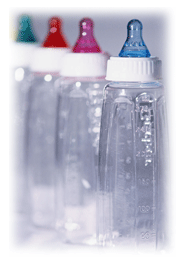Are plastic baby bottles toxic?
A typical night in millions of homes across the country goes a little like this: you wake up to the sound of hungry baby cries, then stumble to the fridge to pull out a bottle for your baby. You heat the liquid inside and head to the nursery. If you are using a plastic bottle, you're probably of the mind that they are the safest choice; unbreakable and lighter in weight than glass bottles, it seems obvious. Think again!
 A new study performed by Los Angeles-based Environment California reveals that the very plastic bottles we find so convenient may actually be leaching hazardous chemicals such as bisphenol-A, lead and certain phthalates into the liquids they hold. Studies with similar results were performed by the U.S. Food and Drug Administration, Consumers Union (publishers of Consumer Reports magazine) and researchers at Nagasaki University in Japan. A study conducted by the U.S. Centers for Disease Control and Prevention found bisphenol-A in the urine of over 95% of people they tested.
A new study performed by Los Angeles-based Environment California reveals that the very plastic bottles we find so convenient may actually be leaching hazardous chemicals such as bisphenol-A, lead and certain phthalates into the liquids they hold. Studies with similar results were performed by the U.S. Food and Drug Administration, Consumers Union (publishers of Consumer Reports magazine) and researchers at Nagasaki University in Japan. A study conducted by the U.S. Centers for Disease Control and Prevention found bisphenol-A in the urine of over 95% of people they tested.
Plastic baby bottles are typically manufactured using polycarbonate, a material that is very easily molded and nearly unbreakable. But when liquids are heated inside these bottles, the polycarbonate releases the toxic bisphenol-A (BPA), which mixes with the formula or breast milk and is then ingested by the baby.
BPA exposure has been linked to cancer, impaired immune function, early onset of puberty, obesity, diabetes and hyperactivity, among other problems.
Other bottles may be manufactured with polyvinyl chloride, which we know as vinyl or PVC. From a health standpoint, PVC is the most toxic plastic on the market. It can contain lead, ingestion of which can lead to learning disabilities, IQ deficiencies and behavior problems, among other things. Soft PVC, used in the manufacturing of nipples, pacifiers and teethers contains phthalates, which cause many of the same problems as BPA.
The study performed by Environment California found potentially harmful levels of BPA in the five bottle brands they tested:
- Avent
- Dr. Brown's
- Evenflo
- Gerber
- Playtex
As a result of these studies, scientists and consumer advocates recommend that parents choose baby bottles that are made either of glass or a non-polycarbonate plastic. The polycarbonate bottles are generally clear and rigid, and may have the recycling symbol 7 marked on the bottom. If you are unsure about the bottle, call the manufacturer, or just avoid that particular bottle altogether.
Here are a few other tips:
If you must use a plastic bottle, pick ones that are made of a safer plastic, such as polyethylene or polypropylene. You'll usually see recycling symbols 1, 2 or 5 on these plastics. Medela and Evenflo both manufacture bottles made with these plastics.
Choose a tempered glass bottle. While a bit heavier, you'll never have to worry about chemical hazards with glass bottles.
Don't heat plastic bottles on the stove, in the microwave or in hot water. Chemicals are more likely to leach into the liquid when it's heated.
Sources:
- To read Environment California's press release on the study, click here .
- To see what Consumer Reports has to say, click here .